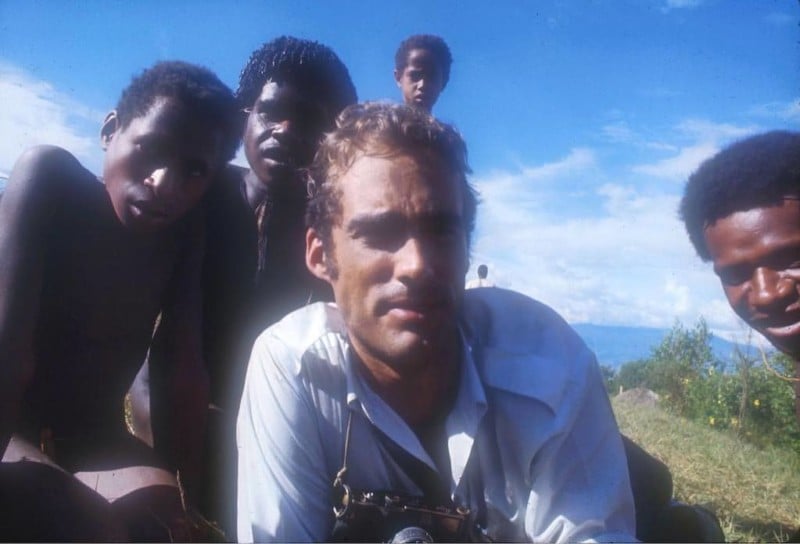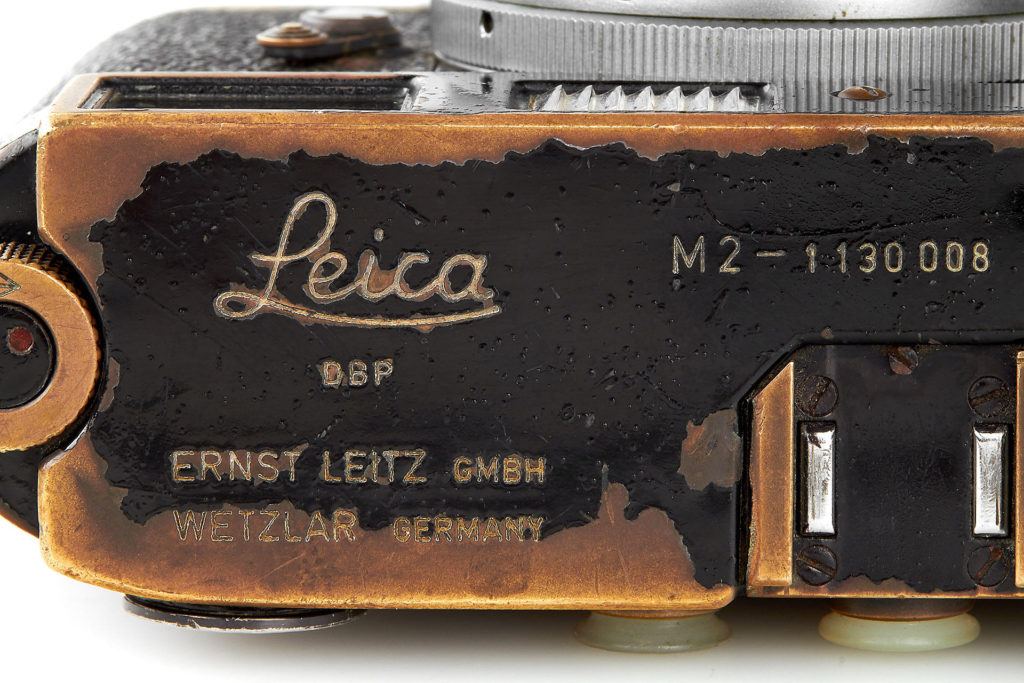

This black paint Leica M2, serial number 1130008, was owned and used by US press photographer Sean Flynn, son of actor Errol Flynn. Flynn used this camera to cover the Vietnam War and Israel’s Six Day War. Flynn often accompanied US special forces units in hostile areas. On April 6th, 1970, Flynn with his fellow photojournalist Dana Stone motorcycled into Cambodia. Neither was ever seen again. It’s thought that both were kidnapped by the Vietcong and given to the Khmer Rouge before being executed. Sean Flynn was declared legally dead in 1984.
His M2 was found in his Paris apartment after his disappearance. Why he didn’t have it with him when he disappeared is anyone’s guess.

Sean Flynn with His Black M2 and Chrome Summilux
The camera, still in good working order, was auctioned off by Leitz Photographica Auctions in 2018 for an unspecified sum. It shows the obvious signs of wear of a black paint Leica used in extreme conditions. It was auctioned equipped with steel-rim Summilux 1.4/35 no.2166593 (from the last series of 200 lenses made in 1966). Attached to the camera was a short strap made from a parachute cord, with steel ring from a hand grenade.


Waiting for the strap review by Thorston von Macheinbild.
Coming up next.
Affectation.
I believe that a lot of those photojournalists out there, as well as many of the troops, were high most of the time. It could explain the recklessness which, in my mind, is not bravery. It might also be the best way to suspend the reality of what they have done to themselves by being present. Unlike the troops, they had the luxury of choice.
As usual Rob, I have nothing much to say, other than to offer a reference to a comic song by Tom Paxton that was contemporaneous. I used to know all the words and sing-a-long to it whenever I played it.
Anyway, it is called “Talking Viet-Nam Pot Luck Blues”.
“Hello headquarters…..
er… hello headquarters?….
We have met the enemy, and he has beeeen smashed”.
Nice!!!! Almost as nice as a Lenny Kravitz limited edition! 🙂
I like cameras with a story and this one definitely is. I remember reading michael herr dispatched in 1983, i have great respect for those guys, sean and tim page among others. Tim is still alive and a real character, he’s on instagram if you want to dig.
Tim Page was, in some circles, thought to be quite crazy too, especially towards the end of that war. I think he’s a rehabilitated soul these days. 😉
My personal combat heroes, though, are/were Don McCullin and Larry Burrows. McCullin has a lot going for him as a photographer, as distinct from a daredevil.
Aside from those two Philip Jones Griffiths was remarkable…..
And a well-educated voice to boot.
It always seems strange that wars can actually break out: you’d have imagined that by now all sides would have realised how wars seldom solve anything, simply create ever more misery.
Perhaps that’s the theory upon which dictatorships thrive: they don’t believe anyone outside their own lands will ever come to fight them on a point of humanitarian principle. Guess it explains Burma as well as China, not to mention Russia.
I remember a statement by Griffiths that sticks with me. “There’s only one thing you need to know about the Vietnam War. The Vietnam War memorial in Washington DC is 493 feet long. If the Vietnamese had the same wall it would be 9 miles long.”
Tim, in your header shot of the statues from the rear: that sheep’s taking one helluva chance if it goes too far off the beaten track. Strange folks up in the hills.
No one ever mentions David Douglas Duncan and the work he produced in three wars:
WW2 (Pacific Theater) Korea (almost from the start of the conflict) and Viet Nam.
Starting in 1986, I began working with Viet Nam veterans, recording their oral histories, making informal portraits, etc. I’ve also used ‘old school’ contacts to put them in touch with their local congressmen for help with the VA, etc.
In the hundreds of stories that have been shared, the topic of getting high has come up often. It cuts across service branches, from enlisted ranks to officer corps. In elite units (Special Forces/SEALS/aircraft squadrons) there was little or no drug abuse. Drinking was common. In regular infantry units, there was some abuse. But (and it’s a big but) the men would not tolerate anyone going out on patrol high (including dare devil photojournalists.) They could lose their lives if someone was fucked up. Survival was upmost in their minds. Fighting was bad enough without worrying about a fellow trooper endangering their lives. When they were in the rear, and standing down, there was drug & alcohol use. There was high racial tension & gay bashing.
There was resentment against the news organization because the men felt they were being unfairly portrayed in the new back home. They were wary of any tag-along photographers or journalists who were inexperienced. But they tolerated photographers because they were in the fight with them when they could stay out of harm’s way. Journalists could attend press briefings and write a story sitting in a cafe (some famous ones did.)
So Rob, I hope this gives you pause and another perspective on Viet Nam. I’m not the end all or be all of this story, and I don’t present myself as an expert…I’m just passing on what I’ve been told over the course of 35 years.
Indeed, I’m sure that many didn’t touch either drugs or booze (what’s the difference since they both distort reality?), not in war and not in peace.
That said, I can also accept that some kind of mind-altering substance might help one get over the fact that one could fall dead at any time from serious lead poisoning or just stumble onto a big bang whilst walking the walk down some track or another.
I’m glad I never had to be in such places, especially when I consider the futility of all that death when, today (or at least prior to Covid), folks can go there on holiday, just like they do in France where they can follow the cemetery tours, sample the cuisine ad the wines, all as if nothing monstrous had happened within living memory. I blame it all on the politicians who know that sending young men to die isn’t the same as sending themselves to die for some political ideal; even the Great Maga didn’t actually go to the Capitol in person. However, the same cynicism and utter lack of shame is what led his pals in the Senate to save his sorry ass a couple of days ago.
It will be interesting to see what happens next time the US tries to lecture Burma, Russia or China on some matter of high morallity.
Dylan’s « masters of war » comes to mind…
Yeah,
we’ve got to clean up the shit from our own stable after that horse’s ass (t)RUMP was put out to pasture before we can run on the international racetrack.
Might as well include Catherine Leroy in there in the hardly mentioned….
Morallity? Heysoos! I must use better spectacles! Sorry.
😉
Another photographer that is hardly mentioned (perhaps because she was a woman?) is the late Dickey Chapple. KIA = Viet Nam.
Um, sorry for the misspelling of her name. No disrespect was intended. I will blame it on getting my first of two COVID-19 shots (jabs.)
The correct spelling: “Dickey” Chapelle. March 14, 1918 – November 4, 1965. KIA while accompanying US Marines on patrol near Chu Lai.
http://www.aaronschuman.com/mccullinarticle.html
The above interview is one that I found to be very powerful.
Enjoy.